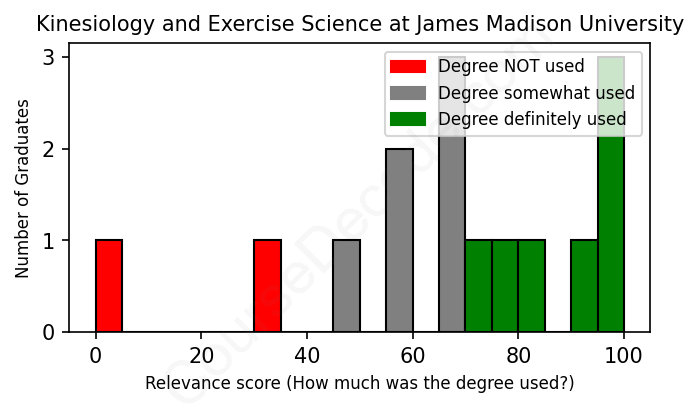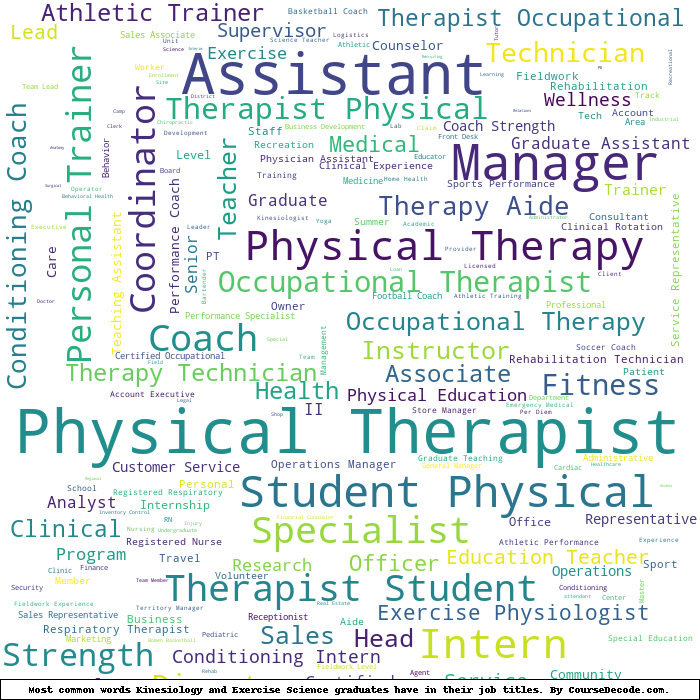
First, some facts. Of the Kinesiology and Exercise Science graduates from James Madison University we've analyzed , here's how many have used (or NOT used) their degree in their career:

These are estimates based on AI analysis of 15 LinkedIn profiles (see below).
The verdict? On par with the average. Overall, with an average relevance score of 67%, Kinesiology and Exercise Science graduates from James Madison University have about the same likelihood of finding work in this field as the average graduate across all fields:
And for comparison, here's the chart for all profiles we've looked at across all degrees.
Also, after graduating, 53% of these graduates have pursued further education other than another Bachelor's degree (such as a Masters degree or other), compared to the average across all profiles of 35%. This suggests you may need more than just a Bachelors degree to be competitive as a Kinesiology and Exercise Science graduate.
See the details:
|
Relevance score: 56% We think this person has gone into a career only somewhat relevant to their degree. We think this person has gone into a career only somewhat relevant to their degree.
DEGREE INFOGraduated in 2017 from James Madison University with a Bachelor of Science - BS in Kinesiology and Exercise Science. Also pursued further education since (see below). JOB HISTORY SINCE GRADUATIONSkilled Nursing Department Therapy Coordinator Select Rehabilitation Mar 2021 - Sep 2021 Executive Assistant to Executive Director  Heron's Key Sep 2021 - May 2023 Assistant Administrator  Avamere Living Sep 2022 - Present FURTHER DEGREES DONE SINCE GRADUATINGMaster of Science - MSUniversity of Northern Colorado 2017 - 2019 ABOUTNo information provided. |
The top 10 most common jobs done by the graduates we've analyzed (ranked most common to least) are:
After looking through the job titles and roles of James Madison University graduates who majored in Kinesiology and Exercise Science, it seems like a lot of them ended up in fields like physical therapy, fitness training, and health supervision. Many of the graduates have worked as physical therapists or student physical therapists, which is super relevant because those jobs require a deep understanding of human movement and rehabilitation, directly applying what they learned in school. On the flip side, there are also quite a few who found themselves in roles like account management, marketing, and administrative positions that don’t really relate to Kinesiology at all. It’s a mixed bag; while some are living the dream in health and wellness careers, others have veered off into areas that don’t make use of their specialized training.
Overall, if we look at the common job patterns, it's clear that positions in health and fitness tend to align well with their Kinesiology and Exercise Science education. However, a surprising number also ventured into roles that seem to stray pretty far from exercise science. So, while these degrees generally open doors to relevant career paths like physical therapy and fitness coaching, it’s evident that some graduates branch out into other fields that may not fully utilize their degree. It’s a great reminder that even if you study something specific, your skills can sometimes be adapted to different roles in the workforce!
Here is a visual representation of the most common words in job titles for Kinesiology and Exercise Science graduates (this is across all Kinesiology and Exercise Science graduates we've analyzed, not just those who went to James Madison University):

Graduates from James Madison University's Kinesiology and Exercise Science program seem to have a variety of career paths, especially in the early stages after graduation. Many of them kickstart their careers in roles that are very much aligned with their degrees. For instance, we see a significant number of graduates landing jobs as physical therapists, fitness specialists, and in other fitness-related roles immediately after school. This trend continues with many sticking to the health and wellness field, such as occupational therapy, physical therapy, and personal training positions. Those who graduated in recent years even seem to be diversifying into areas like sports management and sales within health tech companies, which still tangentially relate to their studies.
However, it's important to note that while many graduates initially find positions relevant to their degree, some later shift into roles that are less connected to Kinesiology and Exercise Science. For example, positions in marketing or sales, like those seen in a couple of graduates' trajectories at Envera Health or Stryker, suggest that some alumni pivot into business roles that may not utilize their specialized training. Over time, it's clear that while some graduates stay on course within healthcare and fitness, others find different avenues that might seem a bit distant from their original studies. Overall, it appears that while there's a solid start in relevant fields, career paths diversify significantly, demonstrating that a degree in Kinesiology can lead to a range of opportunities, both directly related and not so much.
Hey there! So, a Bachelor’s degree in Kinesiology and Exercise Science can be a pretty solid mix — it’s not super easy, but it's not the hardest thing out there either. At James Madison University, you’ll dive into a lot of cool stuff about how the body works, exercise techniques, and maybe even some sports science. If you’re into fitness and enjoy hands-on activities, it might feel pretty engaging. That said, there are definitely challenging courses, especially in anatomy and physiology, which can get pretty intense. Overall, it’s a balanced degree that requires dedication, but if you’re passionate about it, you’ll probably find it manageable and definitely rewarding!
Most commonly, in the LinkedIn profiles we've looked at, it takes people 4 years to finish a Bachelor degree in Kinesiology and Exercise Science.
Looking through the job paths of these JMU Kinesiology and Exercise Science graduates, it seems like many have found their way into decent-paying positions, especially those who moved into specialized roles like physical therapy or safety management. For example, the graduate who started as a Group Account Manager and eventually became a HSSE Manager at ABB likely earns a solid salary. On the other hand, some, like the Fitness Specialist or the coach just starting out, might not be raking it in just yet. But hey, many have room to grow in their careers or shift into higher-paying roles as they gain more experience. Overall, while not everyone seems to be making bank right away, there's potential for a good income as they advance in their fields.
Here is a visual representation of the most common words seen in the "about" section of LinkedIn profiles who have a Bachelor degree in Kinesiology and Exercise Science (this is across all Kinesiology and Exercise Science graduates we've analyzed, not just those who went to James Madison University). This may or may not be useful:

Here are all colleges offering a Bachelor degree in Kinesiology and Exercise Science (ordered by the average relevance score of their Kinesiology and Exercise Science graduates, best to worst) where we have analyzed at least 10 of their graduates: